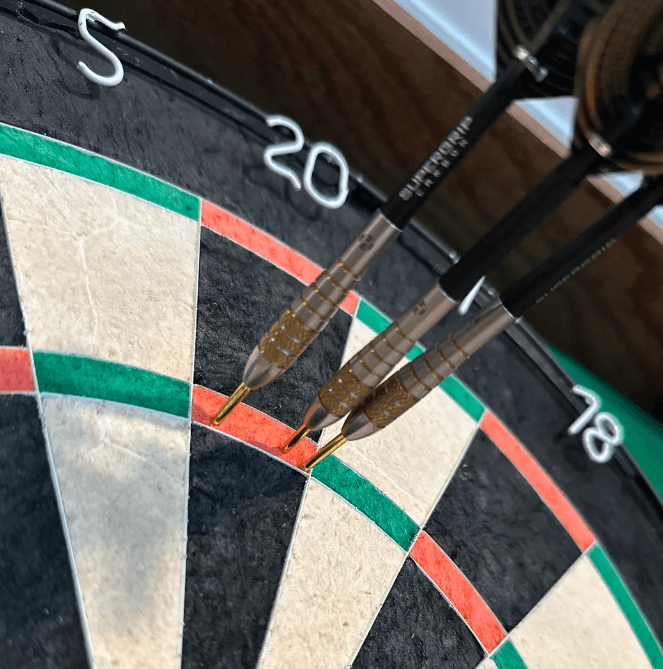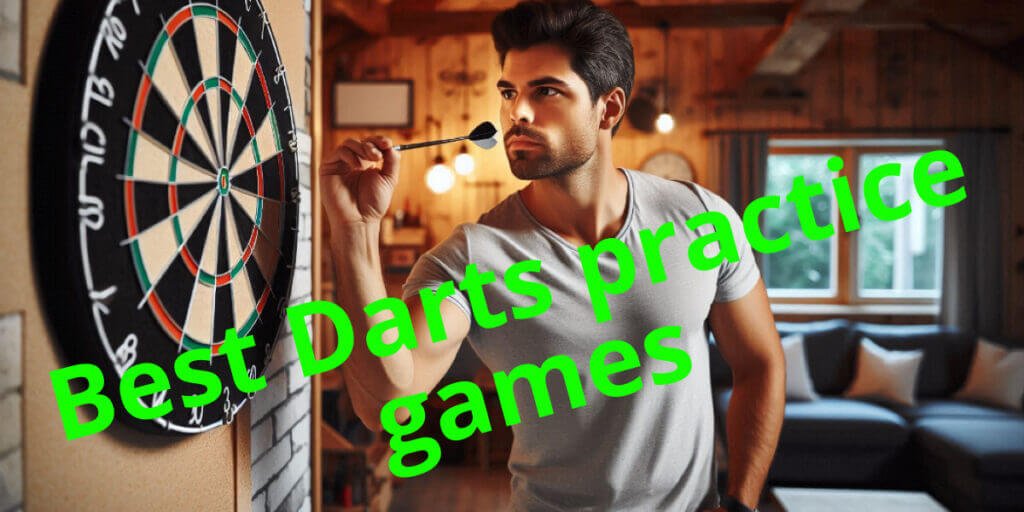Darts is a sport that, while seemingly seems simple, requires a complex interplay of skill, strategy, and psychological fortitude. For players at any level, from casual enthusiasts to aspiring professionals, improvement is a constant goal. One of the most effective ways to enhance your skills and elevate your game is through competing regularly.
This article explores the multifaceted benefits of competing in darts, providing insights into how and why engaging in regular matches can lead to significant development as a player.
1. Understanding the Importance of Competition
At its core, competition pushes individuals to perform at their best. It introduces a variety of factors that casual practice may not encompass, such as pressure, adrenaline, and the unpredictability of opponents. In darts, these elements are crucial for growth, as they simulate the real-world conditions of high-stakes matches. Competing regularly allows players to confront their weaknesses, refine their strengths, and adapt to the dynamics of various playing styles.
One of the primary advantages of regular competition is the exposure to different playing styles and strategies. Each opponent brings unique strengths and weaknesses to the oche, forcing players to think critically and adapt their game plan. This real-world experience is invaluable, as it helps players:
- Develop Strategic Thinking: Competing against various opponents necessitates quick decision-making and adaptability. Players learn to read the game, assess their opponent’s strengths, and devise effective counter-strategies.
- Improve Shot Selection: Regular competition helps players refine their shot selection under pressure. Understanding when to go for high-scoring shots versus safe plays becomes instinctual through experience.
- Gain Insight into Different Techniques: Observing opponents can expose players to new techniques and methods. This cross-pollination of ideas can lead to the development of one’s own unique style.

2. Simulating Pressure Situations
Competition introduces an element of pressure that practice alone cannot replicate. Players often perform differently under competitive conditions compared to casual settings. By regularly competing, players can:
- Build Mental Toughness: Facing pressure in a competitive environment helps develop mental resilience. Over time, players learn to manage nerves, maintain focus, and perform consistently, even in high-stakes situations.
- Enhance Concentration: Competing requires heightened focus, which can lead to improved concentration during practice sessions as well. Players learn to block out distractions and hone in on their performance.
- Boost Confidence: Success in competition, no matter how small, can bolster a player’s confidence. As players experience victories and overcome challenges, their belief in their abilities grows.
3. Setting Goals and Benchmarks
Competing regularly fosters a sense of accountability. When players enter tournaments or leagues, they commit to a schedule that encourages discipline in their practice and preparation. This commitment leads to:
- Clear Goal Setting: Regular competition encourages players to set specific goals, whether it’s improving their average score, mastering a particular checkout, or winning a certain number of matches.
- Motivation to Train: Knowing there’s a competition on the horizon motivates players to practice consistently. This structured approach to training is essential for development.
4. Building a Supportive Community
Participating in competitive darts often involves joining clubs or leagues where camaraderie and support flourish. This community aspect can enhance a player’s journey by:
- Fostering Relationships: Competing alongside others creates bonds and friendships, making the sport more enjoyable and encouraging collaboration.
- Accessing Mentorship: More experienced players can offer advice and mentorship to those looking to improve. This transfer of knowledge is invaluable for skill development.
- Encouraging Friendly Rivalries: Healthy competition can motivate players to push each other to improve, leading to a positive environment for growth.
5. Refining Mechanics
Regular competition provides opportunities to refine technical skills, which are critical for success in darts. Players can focus on:
- Perfecting Throwing Technique: Repeatedly throwing in competitive settings allows players to identify and correct flaws in their mechanics. Consistency in throwing form is crucial for achieving accurate results.
- Mastering Scoring Strategies: Competitive scenarios require players to focus on optimal scoring strategies, such as knowing when to aim for specific segments on the board. Regular play sharpens these strategies.

6. Improving Game Management
Competing regularly also helps players develop their game management skills. This includes:
- Effective Time Management: Learning to manage the time between shots and during matches can significantly impact performance. Players must adapt their rhythm based on the pace of their opponents.
- Shot Planning: Competitive play encourages players to think ahead, planning their shots and moves several turns in advance. This foresight is crucial for strategic play.
7. Coping with Pressure
Darts, like many sports, is as much a mental game as it is physical. Competing regularly helps players build mental resilience and learn how to cope with pressure in various ways:
- Handling Disappointment: Not every competition will end in victory. Learning to cope with losses and setbacks fosters resilience and allows players to learn from their experiences.
- Maintaining Focus Under Stress: Regular competition provides numerous opportunities to practice maintaining focus amid distractions, such as crowd noise or opponent behavior. This skill is vital for high-level play.
8. Developing a Winning Mindset
A successful mindset is essential in competitive sports. Regular competition contributes to:
- Positive Reinforcement: Successes in competition help build a player’s confidence and reinforce positive behaviors. Players learn to celebrate their achievements, no matter how small.
- Overcoming Fear of Failure: Regular exposure to competition helps players confront and manage the fear of failure. Over time, they learn to embrace challenges and view losses as opportunities for growth.
9. Finding Local Competitions
To take advantage of the benefits of regular competition, players should actively seek out local tournaments and leagues. This can include:
- Joining a Darts League: Many communities have organized darts leagues that cater to players of all skill levels. Joining one can provide a consistent schedule of matches and the chance to compete against a variety of opponents.
- Participating in Local Tournaments: Look for local darts tournaments or events, whether they are at pubs, clubs, or specialized darts venues. These events often provide a friendly atmosphere and the opportunity to gain experience.
- Online Competitions: With the rise of online gaming, many platforms now offer virtual darts competitions. These can be a convenient way to compete regularly, especially for those with busy schedules.
10. Setting a Training Schedule
To balance competition with practice, players should develop a structured training schedule that incorporates:
- Practice Sessions: Dedicate time to honing specific skills, such as accuracy, scoring strategies, and mental focus.
- Pre-Competition Preparation: In the lead-up to competitions, players should practice under conditions that simulate competition, including time constraints and pressure scenarios.
- Post-Competition Reflection: After matches, take time to reflect on performance. Analyze what went well, what could be improved, and set new goals for the next competition.
11. Seeking Feedback
Regular competition provides numerous opportunities for players to receive feedback on their performance. This feedback can come from:
- Self-Assessment: After each match, players should assess their performance critically. Identify strengths, weaknesses, and areas for improvement.
- Feedback from Opponents: Engaging with opponents after matches can yield valuable insights. They may offer perspectives on your play style or suggest areas for improvement.
- Coaching: If possible, working with a coach or more experienced player can provide structured feedback and tailored strategies for improvement.
12. Staying Informed
The world of darts is always evolving, with new strategies, techniques, and trends emerging. Players should stay informed by:
- Following Professional Tournaments: Watching high-level matches can provide insights into advanced strategies and techniques used by the pros.
- Engaging with the Darts Community: Participate in online forums, social media groups, or local clubs to discuss strategies, share experiences, and learn from others in the darts community.
- Investing in Training Resources: Consider books, online courses, or videos that focus on darts skills and strategies. Continuous learning is key to ongoing development.
13. Conclusion
Competing regularly is not just beneficial—it is crucial for any darts player serious about improving their game. From honing technical skills to developing mental resilience, the advantages of engaging in competitive play are vast and impactful. The experience gained from facing different opponents, learning to cope with pressure, and receiving feedback creates a rich environment for growth and development.
For players looking to elevate their game, the path is clear: embrace competition. Seek out local leagues and tournaments, commit to a consistent training schedule, and maintain an open mindset towards learning. In doing so, players will not only enhance their skills but also deepen their appreciation for the sport, transforming their darts journey into a fulfilling and rewarding experience.
Whether you are a beginner or an experienced player, remember that darts is a lifelong journey of improvement. By committing to regular competition, you will unlock your potential and set the stage for a successful and exciting career in darts.





